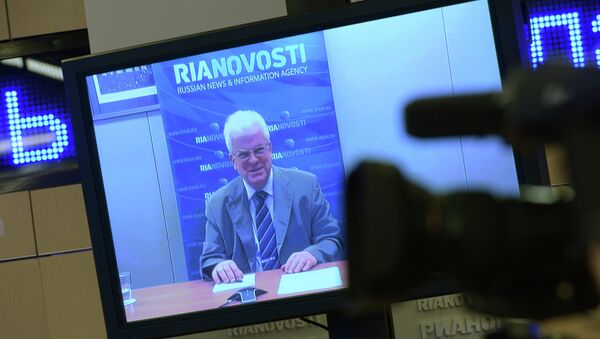BRUSSELS, October 29 (RIA Novosti) – Ukraine’s newly-elected government needs to focus on solving economic problems and resolving the crisis in the country’s southeast, instead of getting entangled in internal strife, Vladimir Chizhov, Russia’s Ambassador to the EU, told RIA Novosti Wednesday.
“What’s important for us and the European Union is that Ukraine has a government that would take responsibility for its own actions, and, preferably, words, and that would finally switch from getting carried away by internal strife to solving real problems that the country is facing in the sphere of economics and to finding a political solution to the situation in eastern Ukraine,” Chizhov said.
According to the ambassador, it is time for the Ukrainian authorities to “be more serious” and work together in a friendly manner, putting pre-election strife aside.
Early parliamentary elections were held in Ukraine on October 26. Ukraine's Central Election Commission said Monday that voter turnout stood at 52.42 percent according to data compiled from all 198 districts.
With over 80 percent of the ballots counted, Prime Minister Arseniy Yatsenyuk's People's Front has garnered 22 percent of the votes and President Petro Poroshenko's party is close behind with 21.6 percent, according to the Central Election Commission.
International monitors said Monday that the election was held in line with democratic norms, despite some violations, and congratulated Ukraine on managing to organize the elections amid the crisis in the country.
The Ukrainian crisis escalated in mid-April, when Kiev launched a military operation against independence supporters in the country’s southeastern regions, who refused to recognize the new government, which came to power as a result of the February coup.
EU Businesses Use Political Influence to Stress Ineffectiveness of Anti-Russian Sanctions
Anti-Russian sanctions are not in the interests of European businesses, which continue to stress that the measures are “the wrong way,” Vladimir Chizhov, Russia’s Ambassador to the EU, told RIA Novosti Wednesday.
“I think it has become obvious that businesses absolutely do not need these sanctions, which run against their interests. And, first of all, this concerns European businesses, and to a lesser extent – American [ones],” Chizhov said.
“First of all they are saying that they will not leave Russia, and second, that they are using all of their political influence here in Brussels and in their own countries to reach out and explain that sanctions are the wrong way,” Chizhov stressed, adding that “by now the European Union has realized how ineffective this instrument [of sanctions] is."
On Tuesday, chairman of US President Barack Obama’s Global Development Council Mohamed El-Erian said the West, and Europe in particular, is one or two rounds of sanctions and counter-sanctions away from a new recession.
The West has imposed several rounds of economic sanctions against Russia over its alleged involvement in the Ukrainian conflict. The restrictive measures target Russia’s oil, defense, and banking industries.
Moscow has repeatedly denied any involvement in the Ukrainian crisis, calling the sanctions “counterproductive” and introducing a one-year ban on certain food product imports from the countries that have imposed the restrictions.
‘Naive’ to Expect Gazprom to Give Ukraine More Credit on Gas Supplies
If a final agreement is not reached during the upcoming trilateral gas talks, it would be “naive” to expect Russia’s energy giant Gazprom to supply more gas to Ukraine on credit, Vladimir Chizhov, Russia’s Ambassador to the EU, told RIA Novosti Wednesday.
“If the parties come to the negotiations and it turns out that there is money, they will only have to sign appropriate papers. But, of course, I do not exclude that the Ukrainian side will come up with something else, some other reason [not to reach an agreement during the trilateral talks],” Chizhov said, adding that “it would be naïve to expect Gazprom to supply gas to Ukraine on credit.”
The gas dispute between Russia and Ukraine became especially acute when Gazprom switched Kiev to a prepayment system for gas supplies in June over Ukraine's gas debt of more than $5 billion.
In September, Russia and the European Commission proposed the so-called winter package, according to which Ukraine should pay $3.1 billion of its debt to Russia by the end of the year in exchange for gas deliveries during the winter period.
Following the trilateral Russia-Ukraine-EU talks in Brussels on October 21, Ukraine agreed to the temporary price of $385 per 1,000 cubic meters of gas during the winter months.
Russia and Ukraine are expected to hold the final round of talks, mediated by the European Commission, in Brussels on October 29.





